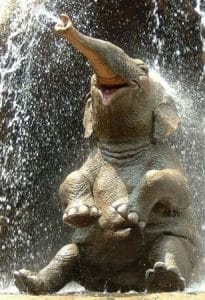
Cyber Security is mostly considered as only a technical issue. It contains, however, many other parameters in addition to the technical competence. Most of these new parameters are actually caused by the fact that cybersecurity is dealt with under the scope of “cyber struggle”. This is because it is obvious that it should be reviewed with a perspective different than the concepts of “security” or “war” considering it as an open-ended process that has its own past, presence and future.
There is no doubt that one of the main factors of this struggle is the struggle specialist. In addition to the technical skills, one of the most important factors that allow the specialist to reach its ideal performance in terms of their efforts carried out individually and as a team is the mental factor. The success of a struggle specialist requires more than the development of the technical knowledge.
Besides the fact that being a team is critically important during the struggle process, the struggle specialist is under the psychological load caused by the aim to attain the task that is assigned to them. The pressure significantly increases when this load is added by the importance of the assignment itself.
Why do some specialists perform better in some days and worse in some other days? Why is it so hard to be consistent? Why do they fail to reach their ideal performance?
For a struggle specialist, there are two main factors to show a high performance and, exhibit their self-skills. The first one is about having a sufficient level of technical skills, and the other is about having the required mental and intellectual skills. It is not possible to reach the ideal performance if one of them is missing.
Being mentally and intellectually strong and showing a perfect performance is not a genetic heritage, but it is something that you can learn Dr. Loehr, Mental Toughness Training
The state created at this point is actually the ideal performance state itself and, depends on certain conditions. These conditions are listed by Dr. Loehr as follows. 
- Motivating and Guiding Yourself
- Being Positive and Realistic
- Being Sure of Yourself
- Being Eager and Ready
- Concentrating and Being Sensitive
Motivation and Mentoring
The habits of motivation and guidance and, the tendency towards these habits are critically important to reach and maintain the ideal performance. An ideal struggle specialist identifies their goals and, takes necessary steps accordingly. The goal is the main component of the motivation. Continuous motivation could be achieved only in line with certain goals.
One could say that the goal is actually the meaning itself. In his book “Man’s Search for Meaning”, Victor E. Frankl tries to explain how critical the goal and the meaning are with this stunning example;
Frankl is a psychiatrist, who has strived to survive in one of the largest concentration camps in Nazi Germany for six years, thus getting a chance to make intensive observations. It was known that everyone in that concentration camp had malaria virus. Frankl observed that those who exchanged their bread with a cigarette have died on the day following due to malaria, but those who kept their bread survived although they had also malaria virus. During the talks with these people, he recognized that each had a goal and meaning for life. Those with a goal for their lives had developed an instinct of eating to survive and, showed high performance. Although they had malaria virus, this virus has never activated in their bodies. On the other hand, those ignoring or eliminating their goals went after for instant pleasures, so that their instincts to protect their bodies have collapsed.
Considering all these facts, it is obvious that a struggle specialist needs a goal and meaning to have mental consistency and, reach their ideal performance. These targets could be those of an organization or some individual or group targets.
Being Positive and Realistic
An ideal struggle specialist would never deny the truth, allege an excuse and, make false representations. They are absolutely realistic and positive. They always tune in the truth.
It should be known that these negativities that may happen generally due to business and career concerns directly harm the very core of the struggle. It is very important that the process is blatantly dealt with and, proper analogies and correlations are established. Individual or group concerns are not more important than the struggle itself and the tasks as a factor of the struggle. At this point, for a struggle specialist, always being in search of the truth is one of the decisive factors in the struggle process.
Being Positive and Realistic
An ideal struggle specialist should not avoid pressures. They should show resistance against high stress, challenges should make him loyal to the tasks and the ideal itself. They should always make efforts to reach their internal potential.
When asked a question about his career, Michael Jordan, who says “limits are like fears and, generally illusions”, answered as follows:
I have missed more than 9000 shots throughout my career. I have lost almost 300 games, and 26 times, I’ve been trusted to take the game winning shot and missed. And this is why I succeed.
Being Eager and Ready
A struggle specialist should be ready for everything, peaceful, energetic and always positive. Being solution-oriented – no matter how bad the conditions are – is always a driving force during the individual struggle process and, in terms of group motivation. It is important that the struggle specialist continues their struggle determinedly and strongly.
Situational Awareness and Being Sensitive
An ideal struggle specialist should have consistent concentration. Having said that, they should intuit what is important, what is not, and take responsibility for a certain case. They should perceive and analyze the events, the people and the conditions around them using the right approach and, be able to make the right directions accordingly.
And, a struggle specialist should also know what being part of a group means. 
Should be sensitive inside or outside the group and, able to touch the lives of people in a positive manner. Should not act at the expense of others in line with their career targets and limbic system reflexes. Should act with the principle “leave none one behind” and able to share their success with the group.
Identifying these five conditions, Loehr has focused in particular the individual and group cases, where physical activities are intensely carried out. These characteristics are those a cyber struggle specialist must-have, but not sufficient.
Since they are also part of the corporate life, a cyber struggle specialist should also have such characteristics that include the dynamics of the environment where they are in addition to these conditions.
When considered from this point of view, one could mention three conditions in addition to five conditions mentioned above. These three conditions that are highlighted below would be useful not only for cyber struggle specialists but also for all the employees working in the respective environment.
Ego
First of all, one should understand what ego is. A child is born. When born, the baby has no awareness and information about themselves, the first thing that they notice is others, not themselves. This is natural, because the eyes are open outwardly, the hands touch each other, the ears hear others, the palate tastes food, and the nose smells the outside. All these senses are outwardly open. This is what being born means. What birth means is arriving at the world of others. 
A baby is first aware of their mother. And then they gradually start to be aware of their own bodies. They get hungry and, feel their bodies; however, this body is a reference of others and belongs to the world. This is because they forget their bodies when their requirements have been fulfilled. A baby first gets aware of others and then, slowly starts to be aware of themselves comparing to others. This awareness is a reflected awareness. A baby is not aware of who they are. They are only aware of their mothers and why she thinks about themselves.
Ego is an accumulated fact, a by-product of living with others. One could say it is a way of the society to reflect who you are. Everybody contributes something to your ego step by step. And the realities of the outer world teaches you that there are some rules to reach the pleasure.
Ego is a tool that balances the reality of the outer world and the pleasure of the inner world. Nowadays, apparent concepts and the degeneration of human values created by the unhealthy competition environment take the ego to a different level.
A struggle specialist is not a narcissist. They are aware of where they are, and at which aspects they are weak and powerful. An ideal struggle specialist runs not against other people but, their targets. They try to raise their bards and standards.
No one tries to jump 2 meters to get over a wall that they could get over by jumping 1 meter.
At this point, a struggle specialist always sets the target higher and, proceed on their ways in line with their target without losing their ties with the reality. He has the strength not to be a person, who is egocentric, considers even a smallest thing as a success, blinded by their love to themselves, inclined to humiliate people around them, fails to establish empathy, is merciless, always demanding, ignoring narcissistic behaviors, and would not lead their lives with the feeling created when they are exposed to such behaviors.
Limbic System
This is the area, where the motives of a person such as flight or fight, emotional reactions, sexual behaviors, fears, and hate are controlled. Those based on the limbic system always act with their basic instincts. They make spontaneous decisions and, have a high level of narcissistic tendencies.
An ideal struggle specialist bring their prefrontal cortex into to forefront, instead of the limbic system. Produces such strategies that lead the struggle to succeed in the long term.
Reacts to emergencies and stressful moments by analyzing and trying the right decision accordingly. Does not get into panic. Is able to bring their feelings under control. But is not insensitive to negative situations such as injustice, mobbing etc. Is an idealist.
Not only bring their limbic system under control but also develop resistance against limbic system-oriented behaviors that could negatively affect the ideal performance state in the environment they work and, knows how to manage them in a way that is useful for the struggle.

And problems of unwilling, continuous complaints and motivation are experienced by those exposed to limbic system-oriented behaviors. At this point, a struggle specialist keeps away from these types of feelings and, always produces positive energy by managing the motivation and willingness in the team.
Elephants in the Brain
In addition to all the conditions discussed above, the last one that needs to be fulfilled is to look out for the juggler in the brain. Elephants in the brain means that a person incubates something that is not actually existing.
For example, a manager hears two employees talking about something and then, combines what he has heard with some other irrelevant facts and, reaches a conclusion. These conclusions are mostly wrong.
And another example is that people may leave their teammates in a difficult situation due to their career or other ambitions.
A struggle specialist always runs against themselves. Inclined to support people and act together. Accordingly, they do not incubate something that is actually not existing. Data is filtrated through the cortex. A struggle specialist does not have bad intentions. Focuses on the ideal performance state and, their own potential. Avoids anything that may harm the struggle.
Knows very well that being success should not be at the expense of others. Contrary, lets their teammates emerge and be a star.
Elephants in the Brain
The world’s leading athletes (intense physical and mental activity specialists) believe that the toughest competitors are themselves. It is very important that one is aware that their toughest competitor is themselves, recognizes thoughts and behaviors that prevent them from being a person they want to be, and turns these types of negative feelings into positive feelings and actions. Therefore, you should avoid result-oriented pragmatist behaviors, focus on the perfect performance and, do your best. The result comes with this process.
Focusing on winning or losing is a wrong strategy. It forces people to make mistakes. Your muscles are strained, become more worried and anxious and, lose your calmness, which results in a poor performance. Highlighting that the most difficult struggle for a person is to fight himself, one should accept that this is harder and more tiring than trying to tire out an opponent.
In this case, first, you need to desire and, then become stronger mentally and technically. Accordingly, some belief patterns that leads a struggle specialist to success could be listed as follows:
- I always do my best.
- I remain positive and solution-oriented under any condition whatsoever.
- I assume all the responsibilities for my feelings, thoughts, and actions.
- I do not seek excuses for my mistakes. I compensate.
The main purpose in this entire process is that a struggle specialist improves themselves, reaches their ideal performance, and positively contributed to the struggle. However, an ideal struggle specialist has another responsibility, which is part of the process when considered from the framework of the ideal performance. It should not be considered separately.
A struggle specialist should touch the lives of the people around them, their teammates or those who they train. In addition to what Michael Jordan about success and trying as indicated above, it was observed that he has maintained his main motivation stated below while reaching his ideal performance, when asked about his feelings.
I hope that millions of people, the senses of whom I achieved to touch, are sufficiently wiling and positive in respect of sharing their goals, efforts and determinations.
A common attitude observed on those, who have reached their ideal performance and succeeded with any form of the struggle, is that each of them bears responsibility for their environment and, shape their point of view accordingly.
Cyber Struggle process is mostly carried out together. Sense of responsibility in respect of reaching the inner potential mentally and technically is very important in terms of the process continuity and, inner peace.
A Cyber Struggle Specialization Course is not only intended to equip the trainees with technical requirements. With its extraordinary methodology and practices, it also helps them to see their inner potentials, changes their points of view and, gives them habits and knowledge necessary to reach their ideal performance. It has adopted the structure of special forces when considered from this point of view.


